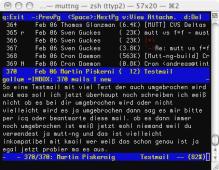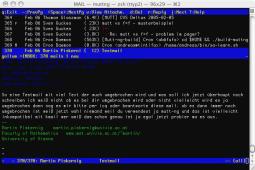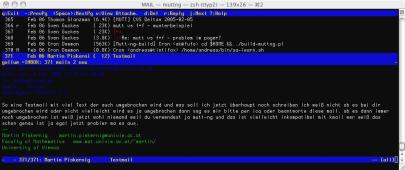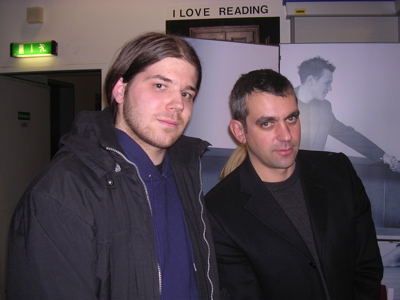Wednesday, February 16. 2005
Yes, you read the title correctly: I'm about to burn out. Probably my mistake was that I was going too long without any real holidays. Of course, it doesn't mean that I will burn out immediately, but I feel that the processes already started slowly. To my colleagues who read my blog: don't be afraid, I will still make it a few months, and I asked for holidays already, anyway.
But nevertheless, that burning-out makes me kind of unhappy, and don't really feel well, and it has negative impact on my overall love life: today I had to temporarily postpone my (remote) relationship with my girlfriend until I've recovered, as I'm currently unable to commit my whole spirit to her.
And that's my plan to recover: no more programming outside work, going out more, relaxing more, sleeping more, no more (active) blogging, no more instant messengers, no excessive emailing, no more posting on the usenet, just getting my head free and getting myself relaxed. But I will not totally give up life, so bits of music and alcohol are still allowed. And I hope that I will get my holidays in about a month, which will be the "climax" of my plan to recover. If anybody knows other ways to get recovered in a long term by whatever measures, feel free to post them.
Good-bye for now.
Sunday, February 13. 2005
le posted an entry about essential questions, and although (or since?) I'm currently drunk, I would like to add my part of it:
Star Wars oder Star Trek? - both of them. Star Trek managed to build up a way better universe than Star Wars did.
Alien oder Predator? - Alien, because the 4th (??) part of it shows you how to get a 2 meter alien through a 2 cm hole.
U2 oder R.E.M.? REM, because they've got a cooler name (a spy jet code name vs. "rapid eye movement"), and their music is better, and they collaborated with Pearl Jam.
Die Ärzte oder Die toten Hosen? Both, but only the old stuff.
Rot oder blau? Green. Is that the politcal question or what?
Hund oder Katze? Neither of them. I hate them both. Probably I hate cats more because I had to do a checkup for canine madness, because I was attacked by one when I was 7 years old.
Wir sind Helden oder Juli? Neither of them. Both commercial crap. Mia rules.
Kelly's oder Pringles? Neither of them. The riffle chips from the 3rd company whose name I totally forgot are definitely the best.
And to answer the questions from the comments:
* Kafka oder Brecht? Kaminer har
Spanish or French? Español es mas bueno. Frances es la idioma de las putas y por los putos. (*harhar*) Yeah, I'm currently learning Spanish. No offence to gay people[1], BTW. 
Populärkultur oder Subkultur? subculture. Diversity is better.
Standard Printausgabe oder Kurier Printausgabe? Standard, because I've got a subscription, and because it's the only newspaper with a moral obligation nowadays.
And finally my questions:
Nirvana or Pearl Jam? - Pearl Jam. Kurt Cobain couldn't even wash his hair, but Eddie Vedder cut it to overcome the grease-in-the-hair problem. And they make the better music, on a side note.
vim or emacs? vim. Modal editors are just more powerful.
KDE or Gnome? KDE. I used to be a Gnome zealot, but in the meantime, KDE is simply better, and made greater progress in terms of technical advantage.
Yes, I'm drunk, and I feel it.
[1]: the sentence means "French is the language of the whores and for the fags." (or for the "male whores", that depends on how you interprete "putos")
Saturday, February 12. 2005
Today I configured my very first iSCSI target and initiator, both on Linux. Unfortunately, I only have old and slow hardware at home (you are still invited to donate), so the performance isn't really a lot of fun (see below), but installation and configuration is a charm: basically you only need iSCSI Enterprise Target for Linux (2.6.9 or later required) for the target (that's the server in iSCSI speak) and linux-iscsi on the initiator (that's the client in iSCSI speak). Installation of both is really easy, just follow the instructions in the README files. Then, you need to configure at least one node on the target. This HOWTO explains how. Even though it's referring to the Ardis Technologies implementation, the description works fine with the iSCSI Enterprise Target, since it's simply a fork. After that, configure the initiator after the same HOWTO (in my case, the ietd.conf on the target and the iscsi.conf on the initiator both have 6 lines each, so it's really very easy) and start iscsid on the initiator. Have a look at your syslog on both hosts. With iscsi-ls you can view your available iSCSI nodes on the initiator, and you can partition, format and mount them like any other devices.
Here you have the bonnie++ output, as already mentioned, the performance is quite poor, but the bottleneck in my case was the slow network (one of the involved hosts only has a 10 MBit network card, and every other 100 MBit network card I tried made Linux crash...):
Version 1.02b ------Sequential Output------ --Sequential Input- --Random-
-Per Chr- --Block-- -Rewrite- -Per Chr- --Block-- --Seeks--
Machine Size K/sec %CP K/sec %CP K/sec %CP K/sec %CP K/sec %CP /sec %CP
nirvana 56M 1011 68 1148 4 395 3 678 49 916 6 65.2 4
------Sequential Create------ --------Random Create--------
-Create-- --Read--- -Delete-- -Create-- --Read--- -Delete--
files /sec %CP /sec %CP /sec %CP /sec %CP /sec %CP /sec %CP
16 225 97 7786 97 6054 100 236 98 7671 97 832 98
Friday, February 11. 2005
Thursday, February 10. 2005
Who can donate some hardware to me? It would be only for a few weeks, and then I will return the hardware when I'm finished.
Why? Because I want to do some experiments with iSCSI on Linux, using iSCSI Enterprise Target, the iSCSI initiator from the Linux-iSCSI project and the Microsoft iSCSI initiator, do performance tests and compare the performance of the different filesystems with the performance of network filesystems like NFS and SMB.
What hardware do I need? Two reasonably fast computers (fast enough to handle GBit ethernet), GBit ethernet cards, a GBit ethernet switch and the right cables, and one of two computers should have a dedicated SCSI harddisk.
What is the outcome? First of all, I will write a report about the performance tests, and publish it. You will be given credits as donator.
If you can donate all or parts of the required equipment, please contact me. If you write an email to some @synflood.at address, please be aware that I will able to answer tomorrow evening, because I fucked up my mail server today in the morning, and neither fetchmail nor ssh are currently running, so I cannot even fix it remotely. :-/
Tuesday, February 8. 2005
I had to play with creating another panorama picture, and, well, here it is:

Below you can see my very first panorama picture, taken from my balkony, and put together using autopano-sift, hugin and this tutorial. It's not perfect, but nevertheless, it's a start:

Monday, February 7. 2005
If you want to see a hilarious documentation about Mozart's (aka Wolfgang Romatz Edler von Sauschwanz aka Franz v. Nasenblut) life, go and watch Der Wadenmesser. Mozart had an incredibly strange life, and Kurt Palm presents it in an extremly funny but still well-researched way, with lots of more or less useless facts, in a style similar to "Sendung ohne Namen", but way more relaxed. The movie also contains its cruel scenes, like an ox is being slaughtered, or a real person having a real blood-letting! And if you really watch this movie, be sure to memorize the riddle in the beginning, because you will have to wait for the answer for several thousand seconds, and they won't tell you the riddle again in the end, only the answer...
Sunday, February 6. 2005
Since today, mutt-ng contains better support for messages formatted after RFC 2646, aka "format=flowed" aka "f=f" ( more information). Now mutt-ng dynamically fits the line length of such messages to the terminal's size. But simply take a look at the screenshots:



Thursday, February 3. 2005
I just don't get: so many times, digitally signing/"certifying" applications is presented as the solution to application security issues. But what does digitally signing applications have to do with application security? Nothing, it seems to me, as it only proves that the application was signed by a certain entity. It makes absolutely no point about any security implemented in the application. Digitally signing an application doesn't mean auditing it. It would be way to much work to code-audit every single application that is about to be signed and published, and still wouldn't actually prove security. So what is the point of digitally signing applications, except for triggering a false sense of security in the lay-user? Or am I just too stupid to get the whole concept?
Friday, January 28. 2005
Yes, I admit it, I'm a fanboy. Today I've been at an event where Wladimir Kaminer, the author of Russendisko and other books, read a few unpublished stories from his new upcoming books about soviet cooking and music. It was just brilliant, and I really enjoyed this a little bit more than one hour. Afterwards, I even bought yet another book (Schönhauser Allee), got it signed, and even took a photo of Wladimir and myself (actually, someone else took it).

Since yesterday, I'm using Adium X as instant messenger client unter Mac OS X. Adium X is based on libgaim, and so I can finally throw away all the other IM clients I had running before as Adium X connects to Jabber, ICQ and MSN (and many more, but these are the protocols I use). It perfectly integrates into the OSX GUI, supports tabs, it looks really cool, and the duck logo is cute. And it calls itself "the best IM client ever". Well, I'm still missing some bits and pieces, but it's definitely better than the other clients I've used before, so I think I can agree on that.
Oh, one more thing: for a huge pile of nifty add-ons and extras, have a look at www.adiumxtras.com.
OK, it's time again for a rant about Symbian OS. First of all, I would like to point to an article about Symbian OS design faults. If you know about Symbian OS programming, you will know about most of the things mentioned in the article. If you like your job as developer for Symbian OS (which I cannot image), you will deny that these are issues, and that it's all intended. If you don't like Symbian OS (like me), you will most likely say, "Oh, how true" (like me). In case you don't know about Symbian OS, I can still recommend reading the article, as it tells you about the daily horrors of development on this crude platform.
Then, a colleague found another "nice" piece (see here). The last two paragraphs of the CCoeControl::PrepareForFocusLossL() method are contradicting each other, and the best thing is that the last but one paragraph is actually not true - at least not for any of the CCoeControl-derived classes where he would require that method. gna
And last, but not least, I'm currently trying to locate a bug that leads to interesting symptoms like the debugger sometimes stopping the program on more or less random position like the DLL of the ethernet driver or the drag'n'drop support for the Symbian OS emulator. This operating system, and especially its version for the Series60 type of mobiles, is one of the worst pieces of software I've ever seen, both in complexity, easy debugability (does this word even exist), and quality of documentation. Oh, yeah, the documentation: all Series60-specific things in the documentation are either header files, reformatted in nice HTML (and hyperlinked!), or if there is "additional" information text, a mere rewording of the class and/or method name.
Monday, January 24. 2005
Last weekend, I spent quite a lot of time with hacking on mutt-ng, my mutt fork. I was able to integrate a number of interesting features, such as the edit-threads patch (Debian users probably know this), the GNU TLS patch (I integrated it in such a way that the person who compiles mutt-ng can decide whether OpenSSL or GNU TLS shall be used), then Thomas Glanzmann's excellent header cache patch, which greatly increases performance when using IMAP, and Florian Weimer's fix to improve performance with Maildir on Linux 2.6 and ext3. Besides that, I implemented an option to set mutt's umask, which will be honored whenever files are created in write mode. Before, the mutt developers dogmatically refused to implement such a feature, and simply hard-coded the umask to 077. Thanks also to Michael Prokop who tested the latest versions of mutt-ng and helped uncover several issues with the build system and a small regex bug which I was quickly able to fix.
Oh, and one more thing: if you don't want to install subversion, but still want to try out mutt-ng, you can download daily snapshots from http://mutt-ng.berlios.de/snapshots/.
|













